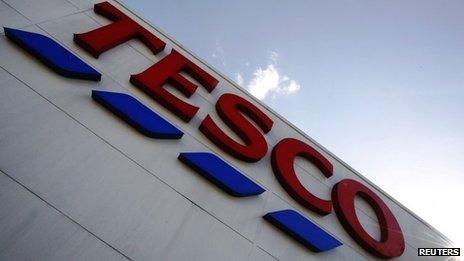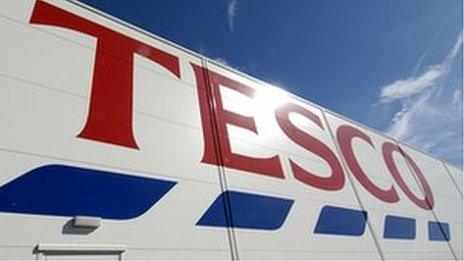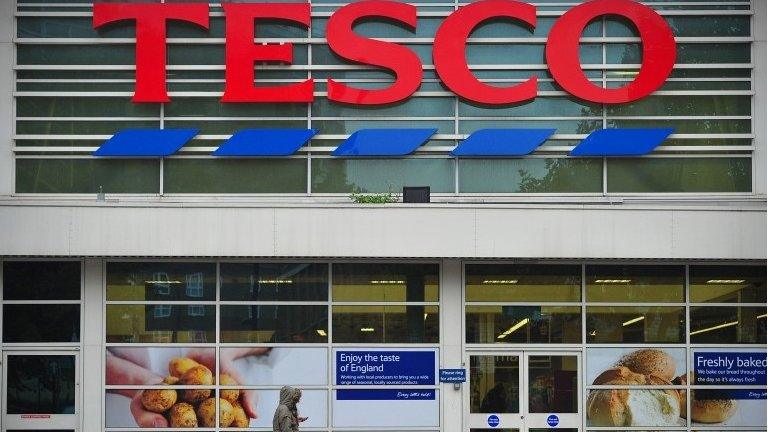Tesco announces 6% fall in profit
- Published

Tesco has been losing market share to discount rivals Lidl and Aldi
Tesco has reported a 6% fall in group trading annual profit to £3.3bn as it continues to lose market share to discount rivals.
It is the second year in a row in which the supermarket has announced falling profits.
Tesco said like-for-like sales, which strip out the effect of new store openings, also fell by 1.4%.
But the fall is not quite as bad as many analysts had expected. Many had forecast a fall of up to 10% to £3bn.
Alongside its struggling UK business, Tesco also announced a £734m loss of value in its European business, which has been hit by the eurozone crisis.
In Europe, group trading profit fell 28% to £238m as sales in the Czech Republic, Hungary, Poland, Slovakia and Turkey, as well as Ireland, all slumped.
Group trading profit was also down 5.6% in Asia to £692m.
Tesco's core UK market share has fallen to a near 10-year low.
Rapid change
Sales at UK stores open over a year, excluding fuel and VAT, fell 3% in the last three months of Tesco's financial year, the sharpest quarterly drop since Philip Clarke became chief executive three years ago.
But the supermarket reported strong growth of 11% in its UK online grocery sales, while sales at its Tesco Express stores grew 1.1%.
Tesco is refreshing 650 stores across the UK over three years and plans to focus on a multi-channel offering that will include a greater focus on its online offering.
Mr Clarke said: "We are transforming Tesco through a relentless focus on the most compelling offer for our customers.
"Our results today reflect the challenges we face in a trading environment which is changing more rapidly than ever before. We are determined to lead the industry in this period of change."
The supermarket has also recently cut prices on essential items such as bread, eggs and milk by 24% in an effort to compete with discount stores. But Mr Clarke admitted that it was "impossible" to win against stores likes Lidl and Aldi.
He told the BBC: "Discounters will never allow you to be cheaper than them. But you can get closer to them."
Questioned on his future, Mr Clarke told BBC Radio 4's Today programme: "I intend to be here to see this job through. We are in the middle of a very big change and I intend to see it through and lead my team.
"I will focus on what I have got to do. Many people want to talk about business leaders, but I know what I have got to do."
Resignation
At the beginning of April, Tesco confirmed the resignation of its finance director, Laurie McIlwee, after 15 years with the company, following what is believed to have been unrest among investors.
Tesco boss Philip Clarke: Supermarket "will thrive" once more
His resignation followed a 23.5% fall in half-year pre-tax profits in October.
At the time, Tesco blamed the fall on a challenging retail environment, particularly in Europe.
The half-year figures showed that Tesco's UK like-for-like sales - which exclude new store openings - fell by 0.5%.
At the same time, Sainsbury's reported a 2% rise in like-for-like sales during the second quarter of its financial year.
In recent years, Tesco has found itself locked in a price war with rivals including Aldi and Lidl.
Recent industry figures showed the UK's "big four" supermarkets - Tesco, Morrisons, Asda and Sainsbury's - all lost market share in the first 11 weeks of this year to rival discount stores, as well as upmarket rivals Waitrose and Marks & Spencer.
Second year
Last April, Tesco announced the first fall in its profits in 20 years to a restated £3.5bn.
But its statutory pre-tax profits fell 51% to £1.96bn.
The results included a £1.2bn write-down on Tesco's Fresh & Easy US chain of stores, which had never turned a profit.
Tesco also wrote down £804m on its UK property portfolio.
The supermarket's post-tax profits including the cost of the US exit were just £120m, down 95.7%.
- Published16 April 2014
- Published17 April 2013

- Published19 March 2014

- Published13 February 2014
